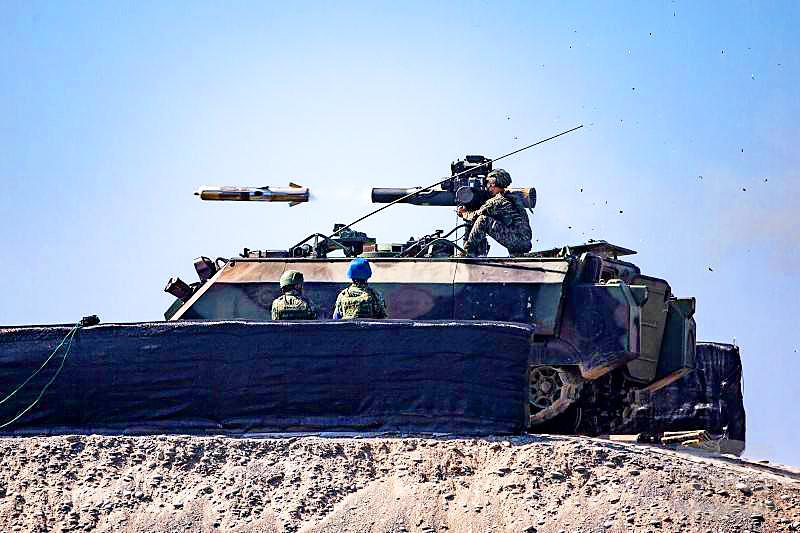Taiwan’s budget for this year’s purchase of 460 TOW 2B anti-tank missiles has been increased to NT$11.57 billion (US$398.91 million), up from an initial allocation of NT$11.36 billion, the Ministry of National Defense said yesterday.
The ministry did not disclose a reason for the increase.
The armed forces are to receive the TOW 2B Aero radio frequency-controlled anti-tank missiles in a shipment with 46 improved target acquisition systems, 46 Humvee vehicles and miscellaneous other equipment.

Photo courtesy of Military News Agency
Another batch of 1,240 missiles, 54 targeting systems and 54 vehicles is planned for 2024, which would complete the deal.
A defense ministry official said on condition of anonymity that the weapon systems would significantly boost the anti-armor capabilities of the nation’s armed forces.
The military uses older, wire-guided TOW 2A anti-tank missiles with inferior range that can veer off course if terrain features interfere with the wire, the official said.
The new missiles, which the US military first fielded in 2012, have an effective range of 4.5km and a top attack mode to target the top of armored vehicles, where they are most vulnerable, the official added.
The TOW 2B can hit a target within 23 seconds of being launched, which enhances the anti-armor team’s ability to rapidly deploy and engage armored vehicles, the official said, adding that possessing such weapons would help the nation deter would-be aggressors.

Trips for more than 100,000 international and domestic air travelers could be disrupted as China launches a military exercise around Taiwan today, Taiwan’s Civil Aviation Administration (CAA) said yesterday. The exercise could affect nearly 900 flights scheduled to enter the Taipei Flight Information Region (FIR) during the exercise window, it added. A notice issued by the Chinese Civil Aviation Administration showed there would be seven temporary zones around the Taiwan Strait which would be used for live-fire exercises, lasting from 8am to 6pm today. All aircraft are prohibited from entering during exercise, it says. Taipei FIR has 14 international air routes and

Taiwan lacks effective and cost-efficient armaments to intercept rockets, making the planned “T-Dome” interception system necessary, two experts said on Tuesday. The concerns were raised after China’s military fired two waves of rockets during live-fire drills around Taiwan on Tuesday, part of two-day exercises code-named “Justice Mission 2025.” The first wave involved 17 rockets launched at 9am from Pingtan in China’s Fujian Province, according to Lieutenant General Hsieh Jih-sheng (謝日升) of the Office of the Deputy Chief of the General Staff for Intelligence at the Ministry of National Defense. Those rockets landed 70 nautical miles (129.6km) northeast of Keelung without flying over Taiwan,

The Ministry of National Defense (MND) today released images of the military tracking China’s People's Liberation Army (PLA) movements during the latest round of Chinese drills around Taiwan. The PLA began "Justice Mission 2025" drills today, carrying out live-fire drills, simulated strikes on land and maritime targets, and exercises to blockade the nation's main ports. The exercises are to continue tomorrow, with the PLA announcing sea and air space restrictions for five zones around Taiwan for 10 hours starting from 8:30am. The ministry today released images showing a Chinese J-16 fighter jet tracked by a F-16V Block 20 jet and the

City buses in Taipei and New Taipei City, as well as the Taipei MRT, would on Saturday begin accepting QR code payments from five electronic payment providers, the Taipei Department of Transportation said yesterday. The new option would allow passengers to use the “transportation QR code” feature from EasyWallet, iPass Money, iCash Pay, Jkopay or PXPay Plus. Passengers should open their preferred electronic payment app, select the “transportation code” — not the regular payment code — unlock it, and scan the code at ticket readers or gates, General Planning Division Director-General Liu Kuo-chu (劉國著) said. People should move through the